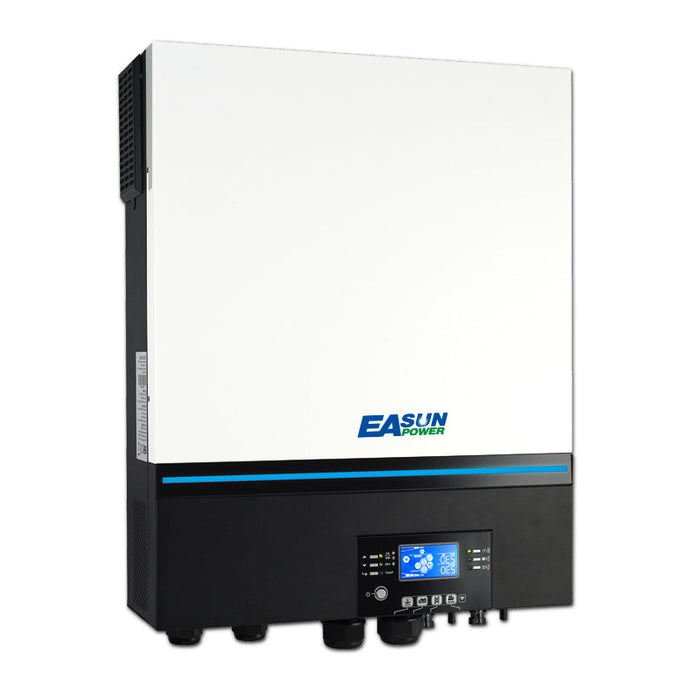Unlock the Secrets to Choosing the Perfect High-Power Solar Inverter with a 150A Charge Controller!
In the modern quest for sustainable living, high-power solar inverters play a crucial role in optimizing solar energy systems. These devices are essential for converting the direct current (DC) electricity generated by solar panels into alternating current (AC), which is used in our homes and businesses. When paired with a robust 150A charge controller, the efficiency and performance of your solar setup can reach new heights. A 150A charge controller not only ensures that your batteries are charged appropriately but also protects them from overcharging, extending their lifespan. This article aims to guide you through the intricacies of selecting the right high-power solar inverter and charge controller combination, leading you to make informed decisions for your energy needs.

Understanding High-Power Solar Inverters
High-power solar inverters are designed to handle significant amounts of energy, making them suitable for larger solar panel systems. Their primary function is to convert DC electricity generated by solar panels into AC electricity, which is what most household appliances use. The power rating of an inverter is crucial, as it determines how much electricity can be converted and supplied to your home. For instance, if you have a solar system capable of producing 5 kilowatts, you’ll need an inverter that can handle that output. Inverters also come with features such as grid-tie capabilities, enabling you to sell excess energy back to the grid. Understanding these functions is vital to selecting the right inverter for your specific energy needs, ensuring your solar system operates efficiently.
What is a 150A Charge Controller?
A charge controller is a vital component of any solar energy system, acting as the intermediary between the solar panels and the batteries. Specifically, a 150A charge controller regulates the voltage and current produced by the solar panels to ensure that batteries are charged efficiently without being overcharged. This regulation is crucial for maintaining battery health and longevity, as overcharging can lead to damage and reduced performance. The 150A capacity indicates the maximum current it can handle, making it suitable for larger solar systems. By investing in a quality charge controller, you ensure that your energy storage is optimized, allowing you to maximize the benefits of your solar energy system.
Key Factors to Consider When Choosing Your Inverter and Charge Controller
When selecting a high-power solar inverter and a 150A charge controller, several key factors must be considered to ensure compatibility and efficiency. First, look at the efficiency ratings of both components, as higher efficiency translates to more usable energy from your solar setup. Compatibility with your solar panel system is also essential; ensure that the inverter can handle the voltage and output of your panels. Installation requirements should not be overlooked, as some inverters and charge controllers may require specific setups or additional components. Warranties and customer service are also important—choose products that offer strong support and guarantees, as this can save you time and money down the road. My friend recently faced challenges with a product that lacked customer support, emphasizing the importance of this consideration. Carefully evaluating these factors can lead to a seamless and effective solar energy experience.
Comparing Different Options Available in the Market
In the market today, various types of high-power solar inverters with 150A charge controllers are available, each catering to different needs. One of the primary distinctions is between pure sine wave and modified sine wave inverters. Pure sine wave inverters provide a cleaner, more stable power output, making them ideal for sensitive electronics like computers and medical devices. In contrast, modified sine wave inverters are often less expensive and suitable for less sensitive appliances, though they may cause issues with some electronics. Assessing the quality and reliability of options is crucial; look for positive customer reviews and seek out recommendations from fellow solar energy users. Understanding these differences can help you make an informed choice that aligns with your specific energy requirements and budget.
Making an Informed Choice for Your Solar Energy Needs
Choosing the right high-power solar inverter and 150A charge controller is a significant step towards harnessing the full potential of solar energy in your home. Throughout this article, we’ve explored the importance of understanding the components of your solar system and how to evaluate various options in the market. Remember to consider your specific energy needs, efficiency ratings, and compatibility as you research your choices. Investing in quality solar technology not only supports a sustainable lifestyle but also leads to long-term cost savings. As you embark on this solar journey, embrace the opportunity to contribute to a greener planet while enjoying the benefits of renewable energy.














